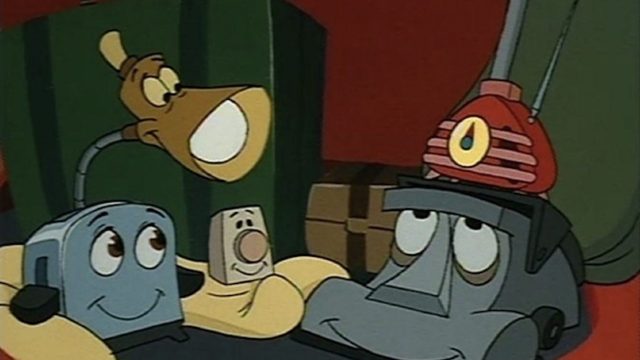This Week, We Will Attempt Peace Between:
- craft and progress
- progress and romance
- romance and ideology
- ideology and polite society
- Seth and McLovin
Big thanks to scb0212 for providing much of this week’s content. Send articles throughout the next week to ploughmanplods [at] gmail, post articles from the past week below for discussion, and Have a Happy Friday!
At Bright Wall/Dark Room Danielle Purdy muses on crafting, loneliness, and The Brave Little Toaster:
Whether because of the repeat viewings or my own wild imagination, as a kid, I deeply believed (and feared) that my belongings were alive. When my mom replaced my ancient and stained mattress in elementary school, I apologized to it through tears, absolutely wracked with guilt for abandoning it. For many years, every night before I went to sleep, I tucked all my stuffed animals around my body. I knew that if any were left out, my betrayal was justifiable reason enough for them to kill me in my sleep. The imagined emotional life of my belongings has always been a burden. I feel constant guilt and responsibility for these possessions, for the life and people they represent. Even if I donated items to a thrift store, The Brave Little Toaster had taught me that they would find their way back to me at absolutely any cost—or, if they couldn’t, that they’d spend the remainder of their days in utter despair and heartache. How could I possibly cause so much pain to things that had brought me joy?
Vanity Fair provides an oral history of Superbad, a movie old enough to try getting its own fake ID:
MINTZ-PLASSE: I was just, like, a scrawny kid. I was super stoked to be there. I had Seth and everyone sign my script because I didn’t think I was going to get the part.
APATOW: In the audition, he was very caustic and attacked Jonah and did improvs insulting Jonah.
ROGEN: Jonah immediately hated him. He was like, “That was fucking with my rhythm. I couldn’t perform with that guy.”
APATOW: Jonah said, “I don’t like that guy. I don’t want him doing it.” And I said, “That’s exactly why we’re hiring him. It couldn’t be more perfect. The fact that it bothers you is exactly what we want.”
For Refinery 29, Nylah Burton discusses the cons of color-blind casting in period romances like Bridgerton and Persuasion:
It makes sense, though, that Black and brown people would want to see ourselves in Regency-era romances. They are the stories that formed many of our first conceptions of love, mainly because of Jane Austen’s novels. Grusha Singh, who examined the Regency era in her postgraduate studies, tells Unbothered that Austen contributed to the heavy romanticization of the period. “Period dramas in general are romanticized, but Pride and Prejudice is nearly everyone’s favorite romance novel,” she says. “Enjoy the fantasy” is a popular response to people of color who push back against Bridgerton’s ahistorical world. But it’s not a fantasy. A world isn’t being invented from scratch. Bridgerton contains real historical events, real historical characters. The history that isn’t discussed is Britain’s brutality, which is not the same thing as fantasy. That is denial.
Writing for Vox, Aja Romano breaks down the issues with Netflix’s romance series Purple Hearts that claims to meet in the middle of an ideological divide:
Except for his casual dismissal of racism, the Luke we see onscreen is just your average white dude. Except for that glaring and suggestive flaw, and outside of his support of the military, we barely even hear what his beliefs are, since disliking liberalism for unspecified reasons doesn’t count. Cassie likewise is your typical Californian. We’re told she’s a strong feminist, and we’re clearly supposed to think she’s the embodiment of too-“woke” Gen Z-ers. But while she’s an independent character, we never hear her voice explicitly feminist beliefs, and certainly not “extreme” ones. Her gestures toward liberalism — flying a Black Lives Matter flag next to a Pride flag on her balcony, or voicing her experience with anti-immigration laws — aren’t extreme either.
At Forward, Sarah Nachimson interviews Jewish philosopher about his viral tweet about having had polite dinners with Nazis:
What Americans don’t understand is that, first of all, everyone said it was always the others. It was never their family. Yet you always discovered, often after the fact, that your friends, the people you knew — their grandparents had some degree of affinity for or connection to Nazism. It was a repeated experience. Everyone would deny that was the case, but I would repeatedly encounter that. It’s complicated, living in a country where Nazism was mandatory for so many years. That has had repercussions. What I’m struggling with in my current writing is the question of “how do you deal with a situation like that?” Where so many people have good memories of that point in time. And you also had a strong denial of it from younger people who were very much defending — understandably defending — their own families.

